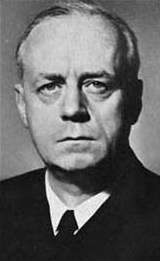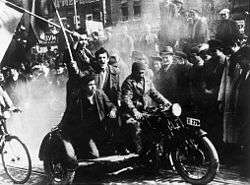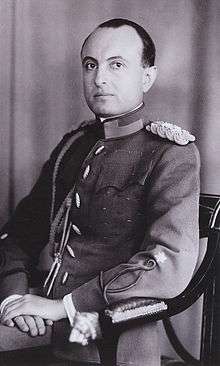Yugoslav accession to the Tripartite Pact
| Signed | 25 March 1941 |
|---|---|
| Location | Belvedere palace in Vienna |
| Signatories | |
| Parties |
The Yugoslav accession to the Tripartite Pact (Serbian: Тројни пакт/Trojni pakt), the Axis military alliance, was signed on 25 March 1941 at the Belvedere palace in Vienna, after months of talks and negotiations between the governments of Germany and Yugoslavia. It was agreed that the Axis powers respect the sovereignty and territorial integrity of Yugoslavia without any time limit, will not seek permission to transport troops across Yugoslavia, nor request any military assistance.
The pact was short-lived however, the Yugoslav coup d'état following on 27 March, and Axis invasion of Yugoslavia on 6 April.
Prelude


After the French capitulation in June 1940, it seemed at the time that only Great Britain would have a little chance to win in a fight against the Germans, and a greater chance to negotiate humiliating peace.[1] As historian Vladislav Sotirović writes, "thus, no wonder why British politicians and diplomats tried with all means, including military coups, to drag any neutral country into war on their side for a final victory against Hitler's Germany".[1] The Kingdom of Yugoslavia had been ruled as a dictatorship by the regent Prince Paul since the assassination of King Alexander I of Yugoslavia in 1934.[2] After the German annexation of Austria in 1938, Italian occupation of Albania in 1939, and the accession of Hungary, Romania and Bulgaria to the Tripartite Pact between 20 November 1940 and 1 March 1941, Yugoslavia was bordered by Axis powers on all sides except the southern border with Greece.[2] Taking into consideration that, apart from this foreign policy factor, and the traditional Croatian separatism, Prince Paul was in great psychological, political and patriotic dilemma in March 1941, in how to resist Hitler's diplomatic pressures but also concrete political offers to sign the accession to the Tripartite Pact.[2] The Yugoslav side was unable to stall as Hitler was in a hurry to commence Operation Barbarossa (invasion of the Soviet Union, SSSR), while the potential Croatian betrayal in case of German invasion was the main trump card of Berlin in negotiations with Belgrade.[2] In the spring of 1941, Yugoslavia could only rely on Great Britain, which comparing to Germany had greater economic and population resources (in regard of the colonial empire).[3] Yugoslavia needed fast military aid, which Britain could offer, upon a rejection of signing the Pact.[3] Prince Paul was an anglophile and relative of George VI, there was an impression that he would rather abdicate than turn his back on Britain, and Hitler viewed him as a British puppet in the Balkans.[3] There was also a possible risk in the Communist fifth column (due to the perception of the Molotov–Ribbentrop Pact), which made General Milan Nedić prepare a plan in December 1940 to open six internment camps for communists if needed.[4] Nedić also proposed that the Yugoslav Army take Thessaloniki before Italian troops did, after the Italian invasion in November 1940, as the loss of the port would make eventual British military aid impossible in case of an invasion of Yugoslavia.[4] The Greeks, however, held firm against the Italians, even entering Albania from where the Italian invasion had begun.[4] Nedić's plan for the communists was uncovered by a spy, the young officer Živadin Simić in the War Ministry, who copied the two-page document which was then quickly handed out in Belgrade by the communists.[4] It was crucial to Hitler to solve the question of Yugoslavia and Greece before attacking SSSR, believing that Britain (which had together with the French declared war) would not accept peace while the threat of SSSR existed (London did hold the Molotov–Ribbentrop Pact as dishonest and volatile, forced by foreign politics plight).[5] Barbarossa needed a Nazified Balkans, and the only unreliable countries in this region were Yugoslavia, with Serbs as traditional German enemies, and Greece, invaded by Italy on its own accord (as an answer to the Anschluss).[5] It became clear that Mussolini could not manage by his own in Greece.[5] The British army in continental Europe successfully fought only in Greece, thus, the military- and political elimination of Greece and Yugoslavia (as potential British ally) would be extremely unproductive.[5] Consequently, seven German divisions were moved into Bulgaria, while the permission for six divisions to cross Yugoslavia into Greece was sought from Prince Paul.[5] On 1 March 1941 Hitler compelled Prince Paul to personally visit him in his favourite resort at Berchtesgaden.[5] The two secretly met in Berghof, Hitler's residence, on 4 March.[6] In an extremely uncomfortable discussion for Paul, Hitler said that after he would throw out British troops from Greece, he would attack SSSR in the summer and destroy Bolshevism.[5] Yugoslav historiography was mainly silent about the fact that Hitler offered Paul someone of the Karađorđević dynasty to become Russian emperor (hinted at Paul himself, as his regency mandate would end on 6 September 1941, when Peter II would become an adult and legitimate King of Yugoslavia).[5] The offer, more imaginary than realistic, did not however crucially influence the Yugoslav regency's decision to accede to the Tripartite Pact on 25 March 1941.[7] Realpolitik was the ultimate factor, Paul having first addressed British diplomatic circles in Belgrade and London, urging help and protection, but was offered no military aid (in contrast with Greece) and it was instead sought that Yugoslavia directly engage Germany militarily (whom the British were themselves losing to at that moment), promising adequate reward after British victory.[7] During the negotiations with Hitler, Paul feared that London would demand a formal public declaration of friendship with Britain which would only irritate and bring no good.[8] Concrete British aid was out of the question, and the fact remained that Yugoslavia now had a common border with Germany after the Anschluss.[8] The Yugoslav Army inadequately armed and would not stand a chance against Germany, which had less than a year prior overwhelmed France.[8] On 12 January 1941 Winston Churchill informed Paul that Yugoslav neutrality was not enough.[8] The German and British demands differed enormously: Germany sought only neutrality and non-aggression agreement while Britain demanded conflict.[8] War Minister Petar Pešić (by the way anti-German and supported by the British), laid out the chances of Yugoslavia in war against Germany on 6 March, stressing that the Germans would quickly take over the northern part of the country with Belgrade, Zagreb and Ljubljana, forcing the Yugoslav Army to retreat into the Herzegovinian mountains where it would hold out for at most six weeks before capitulation, without enough weapons, ammunition and food.[9] Accordingly, the next day Dragiša Cvetković sent the German diplomacy in Belgrade the demands – that the political sovereignty and territorial integrity of Yugoslavia be respected, no Yugoslav military aid or transport of troops across the country during the war, and that Yugoslavia's interest of having access on the Aegean Sea be taken into consideration during the political reorganization of Europe after the war.[9]
Negotiations and discussions
November 1940
On 28 November 1940 the Yugoslav Foreign Minister Aleksandar Cincar-Marković met with Hitler at Berghof.[6] Hitler spoke of his plans of the "consolidation of Europe" and called the Chief of Yugoslav diplomacy to conclude a non-aggression pact with Germany and Italy.[6] When the Yugoslav government agreed, Hitler immediately answered that this was however not enough, as it did not meet the need for the improvement of relations with the Axis powers as it left the question of Yugoslav accession to the Tripartite Pact open.[6]
February 1941
On 14 February 1941 the President of the Government Dragiša Cvetković and minister Cincar-Marković met with Hitler, who insisted on a fast decision on accession, as it was "Yugoslavia's last chance".[6] Hitler had modified his demands, making special consessions to Yugoslavia of whom nothing "contrary to her military traditions and and her national honour" would be asked.[10] He did not demand troop passage, use of the railway, installation of military bases, or military collaboration, and additionally he would guarantee Yugoslavia's national sovereignty and territorial integrity.[10] Finally, Hitler said "This that I am proposing to you is not in fact the Tripartite Pact".[10] They however managed to refuse, and delay the negotiations,[10] abstaining based on that the decision lay in Prince Paul, the first regent.[6]
4 March 1941
On 4 March 1941, Prince Paul secretly met with Hitler at Berghof, where no obligations were taken, noting that he needed to consult with his advisers and government.[6] Hitler had offered concrete guarantees, and told Paul that the accession would have "a purely formal character".[10]
6–14 March 1941


On 6 March, the Crown Council was summoned during which Paul informed of Hitler's demand of accession.[6] Cincar-Marković presented the foreign politics situation and problems related to acceding, War Minister Petar Pešić portrayed the negative military situation, and it was generally concluded from the discussion to accede.[6] It was also concluded that certain limitations and reserves be demanded from Germany, with Cincar-Marković in charge of drafting these points, which would be held in highest secrecy.[11] The conference showed that the question of accession was very serious, and with respect to public opinion, very hard.[12]
The next day, 7 March, Cincar-Marković called Viktor von Heeren to the ministry and informed him of the Crown Council held regarding Hitler's wish for Yugoslav accession to the Pact.[12] Simultaneously, the uneasiness sparked by anti-Yugoslav manifestations and negative articles in the media in Bulgaria in the past days came to the fore.[12] The result of the consultation was that the German Foreign Minister be asked to clarify, through Heeren, whether Yugoslavia would receive (in case of accession) a written statement from Germany and Italy regarding:[12]
- 1. The sovereignty and territorial integrity of Yugoslavia be respected
- 2. No Yugoslav military aid is to be requested
- 3. When a new order be created in Europe, consideration on Yugoslav interest in free access to the Aegean Sea through Thessaloniki
Cincar-Marković noted while presenting the points that there was already a consensus on all questions.[12] He then informed Prince Paul that the German Foreign Minister offered written guarantees.[12] In order to clarify the situation, Cincar-Marković again asked for an exact answer from the German government on confirmation on the questions, which would help the Yugoslav government to implement the desired policy.[12] On 8 March, Heeren strictly confidentially contacted the German ministry that he had a strong impression that Yugoslavia had already decided that it would soon join the Pact if the German side fulfilled the demands presented by Cincar-Marković, or only slightly amend written statements of the German-Italian side.[12] Heeren believed that Ribbentrop's incentive for another discussion with Prince Paul was very appropriate, best held at the Brdo Castle near Kranj.[12] In the Belgrade political and military circles, it was generally discussed about the upcoming joining with the German camp, however, the thought that this would come in stages with the help of government statements prevailed, and not through acceding the Pact, in that way spare the mood of the people which were against it.[12] The same day Heeren contacted Ribbentrop, regarding the latter's instructions, that he decided to immediately see Cincar-Marković and deliver that the German and Italian answer to all three points was positive.[12] Heeren then warned Cincar-Marković that according to the situation it looked like it was in the best interest that Yugoslavia decide on the accession as fast as possible.[12]
On 9 March, continuing the phone conversation, Ribbentrop from Fuschl am See submitted to Heeren the following:[13]
- 1. They are ready to recognize the respecting of sovereignty and territorial integrity in a special note. This could be publicized by the Yugoslav government.
- 2. [Regarding passage or transfer of troops and military aid]
- A. They are ready to promise that no request on passage or transfer of troops be made to Yugoslavia during the war. The promise could be publicized if the Yugoslav government thought it was necessary due to internal politics. Regarding this and the time of announcement could be discussed during the conclusion.
- B.
- C.
- 3.
20–24 March 1941
On 20 March, three Yugoslav ministers, Branko Čubrilović, Mihailo Konstantinović and Srđan Budisavljević, resigned in protest.[14]
After consulting British and U.S. ministers, it was decided that the military situation was hopeless. The Crown Council voted 15–3 in favour of accession.[10]
Signing
.jpg)

On 25 March, the pact was signed at the Belvedere palace in Vienna, by main signatories Joachim von Ribbentrop and Dragiša Cvetković. An official banquet was held which Hitler complained felt like a funeral party.[15] The German side indeed accepted the demands earlier made by Paul and Cvetković, actually made in the hope that Hitler would not accept them and in that way prolong the negotiation process.[16] These perpetual agreements were that Germany respects the sovereignty and territorial integrity of Yugoslavia without any time limit, the Axis powers will not seek permission to transport troops across Yugoslavia, and Italy and Germany assures the Yugoslav government that they do not want to demand any request for military assistance.[16] Ivo Andrić transcripted the document.[16]
German radio later announced that "the Axis Powers would not demand the right of passage of troops or war materials," while the official document mentioned only troops and omitted mention of war materials.[15] Likewise the pledge to give Salonika to Yugoslavia does not appear on the document.[15]
Response
On the following day of the signing, demonstrators gathered on the streets of Belgrade shouting "Better the grave than a slave, better a war than the pact" (Serbo-Croatian: Bolje grob nego rob, Bolje rat nego pakt).[17]
Aftermath

On March 27, the regime was overthrown in a military coup d'état with British support. Seventeen-year-old King Peter was declared to be of age. The new Yugoslav government under Prime Minister and General Dušan Simović, refused to ratify Yugoslavia's signing of the Tripartite Pact, and started negotiations with Great Britain and the Soviet Union. The enraged Hitler issued Directive 25 as an answer to the coup, and then simultaneously attacked Yugoslavia and Greece starting on April 6. The German Air Force bombed Belgrade for three days and nights. German ground troops moved in, and Yugoslavia capitulated on April 17.
Legacy
The State Commission of FPR Yugoslavia decided in September 1945 to proclaim Prince Paul a "criminal" due to, among other things, leading Yugoslavia into the Tripartite Pact.[18] Serbia rehabilitated him on 14 December 2011.[18]
References
- 1 2 Sotirović 2011, para. 2.
- 1 2 3 4 Sotirović 2011, para. 3.
- 1 2 3 Sotirović 2011, para. 4.
- 1 2 3 4 Sotirović 2011, para. 5.
- 1 2 3 4 5 6 7 8 Sotirović 2011, para. 6.
- 1 2 3 4 5 6 7 8 9 Krizman 1977, p. 517.
- 1 2 Sotirović 2011, para. 7.
- 1 2 3 4 5 Sotirović 2011, para. 8.
- 1 2 Sotirović 2011, para. 9.
- 1 2 3 4 5 6 Dragnich 1983, p. 132.
- ↑ Krizman 1977, pp. 517–518.
- 1 2 3 4 5 6 7 8 9 10 11 12 Krizman 1977, p. 518.
- ↑ Krizman 1977, pp. 518–519.
- ↑ Opačić 2003, p. 8.
- 1 2 3 Presseisen 1960, p. 369.
- 1 2 3 Sotirović 2011, para. 10.
- ↑ Ramet 2006, p. 110.
- 1 2 Sotirović 2011, para. 1.
Sources
- Presseisen, Ernst L. (December 1960). "Prelude to "Barbarossa": Germany and the Balkans, 1940–1941". Journal of Modern History. University of Chicago Press. 32 (4): 359–370. doi:10.1086/238616. JSTOR 1872611.
- Ramet, Sabrina P. (2006). The Three Yugoslavias: State-building and Legitimation, 1918-2005. Indiana University Press. pp. 110–. ISBN 0-253-34656-8.
- Vucinich, Wayne S.; Tomasevich, Jozo (1969). Contemporary Yugoslavia: Twenty Years of Socialist Experiment. University of California Press. pp. 53–. GGKEY:5JR74ERLNET.
Further reading
- Aleksić, Dragan (2011). "General Petar Pešić o Paktu 25. marta 1941". Архив. Архив Југославије. 1–2: 114–130. (Serbian)
- Batowski, Henryk (1968). "Proposal for a Second Front in the Balkans in September 1939". Balkan Studies. 9 (2): 335–358. (English)
- Dragnich, Alex N. (1983). The First Yugoslavia: Search for a Viable Political System. Hoover Press. pp. 132–. ISBN 978-0-8179-7843-3. (English)
- Koljanin, Milan (2012). "Pogled iz Vašingtona na martovske događaje 1941. u Beogradu" [Washington's View on the March Events in 1941 in Belgrade]. Istorija 20. veka. 1: 77–88. (Serbian)
- Krizman, Bogdan (1977). "Završni pregovori o pristupu Jugoslavije Trojnom paktu 1941. god." (PDF). Historijski zbornik. Savez povijesnih društava Hrvatske: 517–527. (Croatian)
- Krizman, Bogdan (1970). "Pristup Jugoslavije Trojnom paktu u proljeće 1941. godine". Zbornik Pravnog fakulteta. 3–4: 377–404. (Croatian)
- Mišina, Veljko Đurić (2009). "Краљевина Југославија 1941." [Kingdom of Yugoslavia in 1941] (PDF). Okrugli sto 27. mart 1941: Knez Pavle u vihorima evropske politike [27 March 1941 Roundtable: Prince Paul in the whirlwinds of European policy]. Belgrade: 27. mart 1941. (Serbian)
- Opačić, Petar (2003), "О приступању Југославије Тројном пакту 1941. године" [On accession of Yugoslavia to the Tripartite Pact in 1941] (PDF), Okrugli sto 27. mart 1941: Knez Pavle u vihorima evropske politike [27 March 1941 Roundtable: Prince Paul in the whirlwinds of European policy], Belgrade: 27. mart 1941 (Serbian)
- Popović, Vojin B. (1961), Тројни пакт и мартовски догађаји 1941 [The Tripartite Pact and the March Events in 1941], Politika (Serbian)
- Stojadinović, Milan (1963). Ni rat ni pakt [Neither war nor pact]. Buenos Aires. (Serbian)
External links
| Wikisource has original text related to this article: |
- Sotirović, Vladislav B. (18 December 2011). "Кнез Павле Карађорђевић и приступање Југославије Тројном пакту". NSPM. (Serbian)
